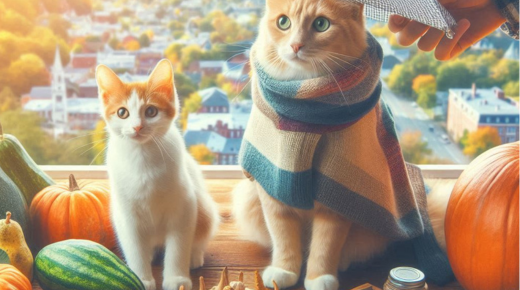As the seasons change in Charlottesville, you might notice that your cat behaves differently. Just like us, pets can feel the effects of weather changes, and it’s essential to help them adjust. In this article, we will explore ways to ensure your feline friend stays comfortable and happy through every season.
Understanding Seasonal Changes
Charlottesville experiences four distinct seasons: spring, summer, autumn, and winter. Each season brings different temperatures, light levels, and weather conditions. These changes can affect your cat’s mood, behavior, and overall health.
For example, during the colder months, your cat may want to curl up in warm spots, while in summer, they may prefer cooler areas. By understanding how each season affects your cat, you can better prepare for their needs.
Spring: A Time of Renewal
Spring in Charlottesville brings warmer temperatures and blooming flowers. This season can stimulate your cat’s playful side, making them more active and curious. However, it’s essential to keep a few things in mind:
Allergies
Just like people, cats can suffer from seasonal allergies. Pollen from flowers and trees can make them sneeze or cause skin irritation. Watch for signs of allergies, such as:
- Excessive scratching
- Sneezing or coughing
- Watery eyes
If you notice these symptoms, it’s a good idea to consult a top local Charlottesville veterinary clinic such as Wag Veterinary. They can help you determine the best treatment options.
Outdoor Safety
As the weather warms, you might be tempted to let your cat explore the great outdoors. However, be cautious. Spring is also a time when various animals are more active, and your cat might encounter other wildlife. Always supervise your cat during outdoor playtime, and consider using a harness if you’re taking them on walks.
Summer: Keeping Cool
Summer can bring hot and humid weather to Charlottesville. While cats are great at regulating their body temperature, they still need your help to stay comfortable.
Hydration
Make sure your cat has access to fresh, cool water at all times. Dehydration can lead to serious health issues. You can encourage your cat to drink more by:
- Using a cat water fountain
- Adding water to their wet food
- Offering ice cubes as a fun treat
Avoiding Heat Stress
Cats can suffer from heat stress, especially if they spend too much time in the sun. Signs include:
- Excessive panting
- Lethargy
- Vomiting
If you notice any of these symptoms, bring your cat to a cooler area and offer them water. If they don’t improve, it’s essential to contact your Charlottesville veterinary office for assistance.
Indoor Fun
To keep your cat entertained during hot days, try engaging indoor activities. Set up play sessions with interactive toys, or create a cozy spot by a window for them to watch the world outside.
Autumn: Preparing for the Chill
As summer fades into autumn, temperatures begin to drop. This change can affect your cat’s behavior in several ways.
Adjusting to Cooler Weather
Your cat might become more snuggly as the days get cooler. Providing them with warm blankets or a heated cat bed can make a big difference. Many cats love to curl up in cozy spots, so creating a comfortable environment is key.
Indoor Safety
As you prepare your home for fall, be aware of potential hazards. Decorations like pumpkins and candles can pose risks to curious cats. Keep these items out of reach to prevent accidents. Also, make sure to store any hazardous materials, like cleaning supplies or gardening products, safely away.
Getting Ready for Winter
As autumn progresses, you’ll want to start preparing for winter. Make sure your cat has a warm place to sleep and plenty of toys to keep them entertained indoors.
Winter: Keeping Warm and Cozy
Winter in Charlottesville can bring cold temperatures and even snow. It’s crucial to ensure your cat stays warm and comfortable during this season.
Indoor Comfort
Provide your cat with plenty of soft bedding and blankets. Many cats enjoy sleeping in small, enclosed spaces, so consider providing them with a cozy cat cave or box.
Limited Outdoor Time
If your cat is used to going outside, limit their outdoor time during the coldest days. If they do venture out, ensure they’re monitored closely to prevent frostbite on their ears, tail, or paws.
Nutrition
During the winter months, your cat may need extra calories to maintain their body heat. Talk to your Charlottesville veterinarian about adjusting their diet to meet these needs. Providing high-quality food can help keep them healthy and energetic.
Year-Round Care
No matter the season, keeping up with regular veterinary check-ups is vital for your cat’s health. Routine visits can help catch any potential issues before they become serious. Your veterinarian can also provide guidance on seasonal care tailored to your cat’s needs.
Enrichment Activities
Regardless of the season, keeping your cat mentally and physically stimulated is essential. Rotate their toys regularly to keep them engaged, and consider introducing new activities. Puzzle feeders or new play sessions can keep your cat entertained, preventing boredom and destructive behavior.
Conclusion
Helping your Charlottesville cat adjust to seasonal changes involves understanding their needs and making a few simple adjustments. Whether it’s providing warmth in winter or ensuring they stay hydrated in summer, your efforts will lead to a happier, healthier cat. Don’t hesitate to reach out to your local Charlottesville veterinary clinic for advice tailored to your pet’s specific needs. With a little care and attention, your furry friend can thrive all year round!

